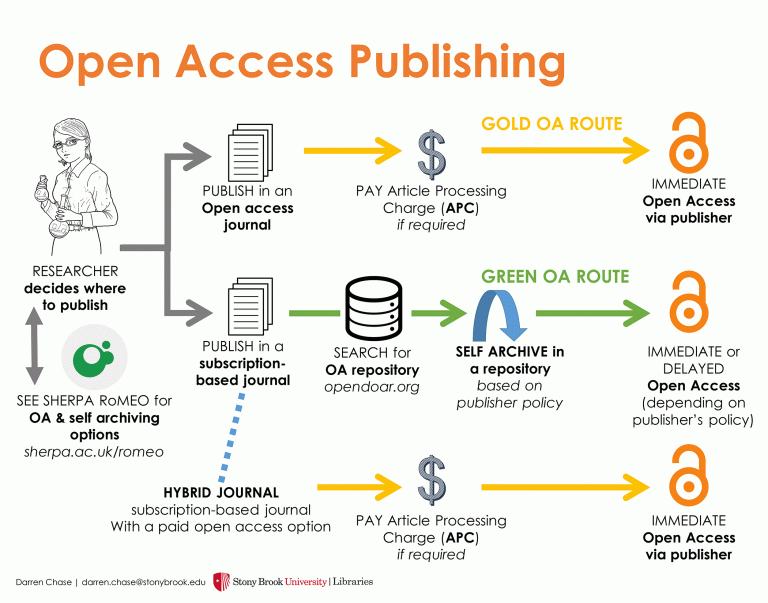If you would like help identifying a high-quality OA journal or assistance self-archiving your past work, reach out to your liaison librarian for assistance.
Open Access is a publishing model where research is made freely available online for people to read and reuse. Open Access ensures that anyone can access and use these results—to turn ideas into industries and breakthroughs into better lives.
In addition to being a type of publishing, open access is a movement that is transforming the traditional model of scholarly publishing and working to create a new mode of scholarly publishing that is more equitable, more beneficial to society, and promotes scientific transparency and rigor. Through unrestricted access and use of scientific articles, OA eliminates the barriers that prevent research from becoming actionable knowledge that improves society.
As an additional benefit to our faculty, students, and staff, the A.T. Still Memorial Library has entered into several agreements that enable ATSU-affiliated researchers to publish open access at no charge with the following publishers:
|
Publisher |
Articles Covered |
How to Publish Your Work Open Access |
|
Cambridge |
Only hybrid journals (ie. No purely open-access journals) List of eligible journals (select A.T. Still University to see journal list) |
Use your ATSU email and list ATSU as your institutional affiliation when submitting work to eligible Cambridge journals. You will automatically qualify for free OA publishing. |
| Oxford |
All open-access articles covered save 19 journals |
Use your ATSU email and list ATSU as your institutional affiliation when submitting work to eligible Springer journals. You will automatically qualify for free OA publishing. |
|
Springer |
Only hybrid journals (ie. No purely open-access journals) Eligible Journals compiled by ATSU - 2024 |
Use your ATSU email and list ATSU as your institutional affiliation when submitting work to eligible Springer journals. You will automatically qualify for free OA publishing. |
|
Wiley |
All open-access articles covered |
Use your ATSU email and list ATSU as your institutional affiliation when submitting work to eligible Wiley journals. You will automatically qualify for free OA publishing. |
| ASM Journals | Eligible Journals | Information can be found here: https://journals.asm.org/s2o-institutional-faq |
| BMJ Case Reports* | Any case report published in BMJ Case Reports | Contact a librarian for the discount code needed to qualify for free publishing submission. |
*not open access, but free to publish in.
To learn more about how to take advantage of these programs or for help identifying journals that fit your research, reach out to your liaison librarian.
The author publishes their work in an open access journal that allows free access to the article immediately upon publication. Journals are peer-reviewed, are easy to find, and allow authors to retain copyright. Gold OA journals sometimes, but not always, charge authors article processing charges (APCs) to publish open access. This is most common when publishing in "Hybrid" journals, where some articles are made open-access in a non-OA journal.
The author makes a version of the article made publicly available in an online repository. This is often called "self-archiving" your work. These repositories can be subject-based (such as MedRxiv), or be specific to a single research institution. Articles can be preprints (not peer-reviewed) or postprints (peer-reviewed), depending on the repository and article in question. Contact the library if you would like assistance understanding if you can archive your published work.

OA publishing is becoming increasingly common, and nearly all the major publilshers you are familiar with publish a variety of open access journals. In addition, many major journals you already know and publish in may have open access publishing options. If you want to publish your work OA, try browsing the websites of publishers and journals you are already familiar with for OA publishing options.
Check out the tools below to help you identify high-quality OA journals that fit your research. You can also reach out to your liaison librarian, who can provide customized journal suggestions based on your research topic and publishing goals.
Your ability to self-archive your work will depend on the publishing agreement you have signed with the journal publishing your work. If you retain the copyright to your work, or publish your work under a Creative Commons license, you can upload your work to a repository. If you have signed away your author rights, many publishers still allow you to self-archive your work, sometimes after an embargo period of 6 months to a year.
To learn more about whether or not you can archive your work, see the Sherpa Romeo tool below, check the author guidelines of the journals you have published in, or reach out to a librarian for help.
There are a wide variety of subject and institutional repositories that can be used to archive you work. Subject repositories accept work from authors from any institution, so long as the work is in-scope of the repository's disciplinary focus. Institutional repositories collect all the work published by authors from a specific academic institution. It is recommended that authors archive their work in both types of repositories when possible.
The A.T. Still Memorial Library is currently in the process of launching an institutional repository, keep an eye out for more information in the near future.
Below is a list of health sciences subject repositories that may accept your work.
If you would like help identifying a high-quality OA journal or assistance self-archiving your past work, reach out to your liaison librarian for assistance.